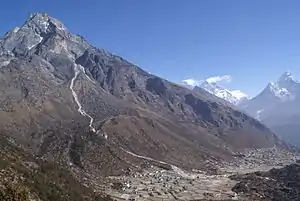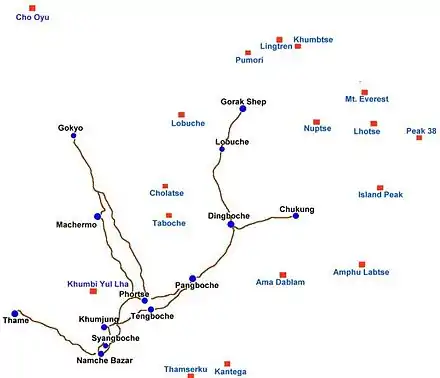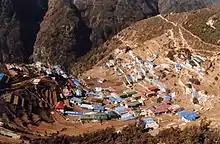Khumbu
Khumbu (also known as the Everest Region)[1] is a region of northeastern Nepal on the Nepalese side of Mount Everest. It is part of the Solukhumbu District, which in turn is part of Province No. 1.[2] Khumbu is one of three subregions of the main Khambu (specially Kulung) and Sherpa settlement of the Himalaya, the other two being Solu and Pharak. It includes the town of Namche Bazaar as well as the villages of Thame, Khumjung, Pangboche, Pheriche and Kunde. The famous Buddhist monastery at Tengboche is also located in the Khumbu.[3]



The Khumbu's elevation ranges from 3,300 metres (11,000 feet) to the 8,848 m (29,029 ft) summit of Mount Everest, the highest place on Earth.[4] The Khumbu region includes both Sagarmatha National Park (above Monju) and the Sagarmatha National Park Buffer Zone, between Lukla and Monju.[2]
The Khumbu is a glacier believed to be the result of the last great Ice Age, ~500,000 years ago.
Lonely Planet has ranked Khumbu region in sixth best region in the world to travel.[5]

Villages in the Khumbu region

References
- Khumbu Everest region
- Bradley, Mayhew; "Trekking in the Nepal Himalaya"; (2009); 9 edição; pp 84-141; Lonely Planet; ISBN 978-1-74104-188-0.
- Bonington, Chris; Everest, The Hard Way; (1977); pp 72-75; Arrow Books editions; ISBN 0-09-915940-6.
- Boukreev, Anatoli; The Climb;(1988); St. Martin's edition; ISBN 0-312-96533-8.
- http://www.lonelyplanet.com/best-in-travel/regions/06-khumbu?detail=1
External links
 Khumbu travel guide from Wikivoyage
Khumbu travel guide from Wikivoyage